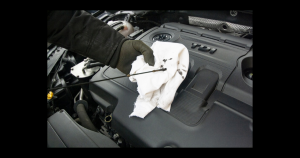 Engine oil is the lifeblood of your car, and routine oil changes are essential for protecting your engine and keeping your vehicle running smoothly. Here we’ll take a look at what happens during an oil change and – more importantly – what happens if you don’t change the oil.
Engine oil is the lifeblood of your car, and routine oil changes are essential for protecting your engine and keeping your vehicle running smoothly. Here we’ll take a look at what happens during an oil change and – more importantly – what happens if you don’t change the oil.
When Should You Get Your Oil Changed?
You should follow your car manufacturer’s specifications, but the recommended oil change interval is generally between 3,000 and 5,000 miles. However, you may need to change your oil more often if you typically drive less than 5 miles at a time, regularly carry heavy loads or tow a trailer, go off-roading, or drive mostly in extremely hot, cold, or dusty conditions. Some modern cars feature oil-life monitoring systems that automatically let you know when it’s time for an oil change.
What Happens During an Oil Change?
When you take your car for an oil change, the technician will first check the oil level and condition, as these can indicate problems. They will then either lift the car up or go into a pit underneath it. The oil drain plug will be removed to allow the old oil to drain out into a container.
While the oil is draining, the technician will remove and inspect the old oil filter and replace it with a new one. The next step is to replace the drain plug and refill the engine with fresh oil. The technician should use the grade of oil recommended by the vehicle’s manufacturer. According to the U.S. Department of Energy, using the wrong grade can reduce your gas mileage by 1% to 2%.
What Happens If You Don’t Change Your Oil?
Over time, the engine oil starts to wear out and break down, causing it to work less efficiently at absorbing heat and lubricating the engine components. Eventually, your smooth, clear oil will turn into dirty sludge. As it continues to circulate, your engine will have to work harder, and the reduction in lubrication can cause you a whole lot of problems.
Not changing the oil can result in:
-
- A void warranty. If your car has a warranty, it can be voided by not changing the oil at the manufacturer’s recommended intervals.
- A blown head gasket, which can be an expensive repair and can lead to other engine damage.
- Inefficient performance. Apart from lubricating, your oil helps keep your engine clean. Dirty oil and a clogged oil filter can lead to less efficient performance and increased fuel consumption.
- A seized engine. When the oil becomes less effective at lubricating and reducing heat, the engine parts will start to grind against each other. Eventually, the components can warp causing the engine to seize up completely. That would mean a new engine or a new car.
So, there you have it. Scheduling a regular oil change is a simple and cost-effective way of keeping your car running smoothly and efficiently and prolonging the life of your engine. It’s one of the quickest and least expensive maintenance services and will save you money in the long run.
Image via pixabay.com | Licensed under Pixabay License


